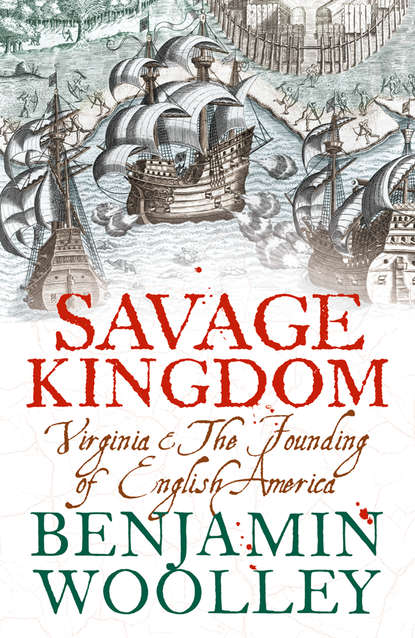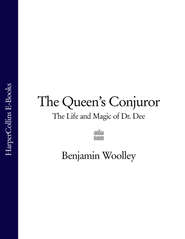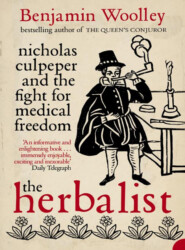По всем вопросам обращайтесь на: info@litportal.ru
(©) 2003-2024.
✖
Savage Kingdom: Virginia and The Founding of English America
Настройки чтения
Размер шрифта
Высота строк
Поля
(#litres_trial_promo)
Meanwhile, on 29 July, the Susan Constant slipped into Plymouth harbour. Newport scribbled a letter to Cecil, announcing his arrival, and the discovery of ‘a river navigable for great ships one hundred and fifty miles’. ‘The country is excellent and very rich in gold and copper,’ he reported, adding that ‘of the gold we have brought a Say’ or sample, which he hoped to present to the King and the Privy Council. ‘I will not deliver the expectance and assurance we have of great wealth, but will leave it to Your Lordship’s censure when you see the probabilities.’
The remainder of the letter contained excuses for not leaving his ship and making the journey overland to London. His ‘inability of the body’ detained him, he wrote, possibly referring to the difficulty of making a long journey on horseback with a missing arm. So he would sail his ship round to London as soon as ‘wind and weather be favourable’.
(#litres_trial_promo)
His desire to spend some time at Plymouth might not have been motivated by medical needs alone. He had probably decided to allow the crew time to sell some of the sassafras they had brought from Virginia. They would have found on the quayside at Plymouth any number of merchants happy to buy the precious commodity without declaring it to the port authorities. The lack of any subsequent references to it in the official correspondence would suggest this is what happened, depriving the settlers and investors of some of the cash needed to pay for the promised supply mission.
The Susan Constant took two weeks to make the final leg of the journey to London. Sir Walter Cope was waiting impatiently for her, eager to get his hands on the ‘sperm’, as he called the ore sample, which he hoped would fertilize England’s new American possession.
In a letter of 12 August, reporting the ship’s arrival to Cecil, Cope’s excitement was uncontainable: ‘If we may believe either in words or Letters, we are fallen upon a land that promises more than the Land of promise: instead of milk we find pearl, & gold instead of honey.’ He acknowledged that Cecil might treat such claims with ‘slow belief’. There was, after all, ‘but a barrel full of the earth’ to show for this first mission. But he hoped that tests to be conducted that very day would reveal ‘a kingdom full of the ore’.
(#litres_trial_promo)
‘I could wish your Lordship at the trial,’ Cope continued. Cecil’s ‘word and presence may comfort the poor citizen of London’. Many had evidently refused requests to continue backing the venture, despite an attempt the previous March to enlarge the Royal Council and thereby increase the investors’ representation.
(#litres_trial_promo) In Cope’s opinion, they might be persuaded to ‘adventure much more in this most hopeful discovery’, but would need ‘a little help’ from Cecil, probably meaning further reform to the council and the company’s unusual structure. There was no shortage of money, he noted. Sir Thomas Smythe (who, Cope added in a marginal note, would benefit from ‘a word of thanks’ from Cecil ‘for his care and diligence’), had recently persuaded ‘fifty citizens’ to offer £500 apiece for a share in an East India Company expedition to the Far East.
(#litres_trial_promo)
By the following day, Cope’s mood was very different. Four trials of Newport’s soil samples, conducted in various laboratories around the city, had produced not so much as a grain of gold. ‘In the end, all turned to vapour.’ There had been suspicions the previous day that John Martin, who had tested the soil in Jamestown, had not done so properly. Now, Martin was accused of having ‘cousined’ (fooled) not only Newport, but the King, the State and his own father – the latter, Cope suggested, in a desperate attempt to persuade the mean old plutocrat to send some private supplies, ‘which otherwise he doubted never to procure’.
(#litres_trial_promo) Newport at this stage appears to have given up hope, and announced that he did not intend to return to Virginia.
By mid-August, things were looking a little more hopeful. On 17 August, Sir Thomas Smythe, braiding every strand of influence in the hope of keeping the project together, informed Cecil that Newport was back on board. The captain now claimed he must have brought back the wrong sample. He pledged to lead the supply mission back across the Atlantic, ‘never to see your Lordship before he bring that with him which he confidently believed he had brought before’.
(#litres_trial_promo)
Others remained sceptical. A week later, the diplomat Dudley Carleton, one of Cecil’s protégés, sent his regular correspondent John Chamberlain a downbeat assessment of the settlement’s prospects. ‘They write much commendations of the air and the soil and the commodities of it, but silver and gold have they none,’ he wrote, ‘and they cannot yet be at peace with the inhabitants of the country.’
He seemed well-informed, having somehow managed to see a copy of a letter from George Percy smuggled to his brother the Earl of Northumberland, who was still languishing in the Tower for his involvement in the Gunpowder Plot. ‘They have fortified themselves and built a small town which they call Jamestown,’ Carleton added, ‘and so they date their letters.’ He then proceeded to produce a series of convoluted puns ridiculing the settlers’ efforts. Never mind a supply from England, they could expect a ‘double supply’ from the Spanish – a mission sent to wipe them out. ‘The town methinks hath no graceful name,’ he mused, pointing out that it was not only dangerously close to Spanish Florida, but came ‘too near Villiaco’, meaning villainy. George Percy, he noted, called the town ‘James-fort, which we like best of all the rest, because it comes near to Chemesford’, Chelmsford, a town in Essex which one Puritan inhabitant described as a ‘dunghill of abomination’.
Carleton then added a postscript about Captain George Weymouth. Weymouth had apparently been ‘taken’ the week before, ‘shipping himself for Spain, with intent as is thought to have betrayed his friends and showed the Spaniards a means how to defeat this Virginian attempt’.
(#litres_trial_promo)
Carleton, who was usually well informed on political matters, was obviously unaware that Weymouth had been ‘shipping himself for Spain’ on Cecil’s orders. However, he was correct in guessing that the mission somehow threatened ‘to defeat this Virginian attempt’, for as soon as Newport arrived back in England, the government made strenuous efforts to prevent Weymouth from leaving the country.
(#litres_trial_promo) For the sake of his cordial relations with Spain, Cecil had evidently been poised to abandon England’s claim to North America, and only the belated appearance of Newport’s ship had won a stay of execution.
Don Pedro de Zuñiga, the Spanish ambassador, had remained poorly informed about the Virginia mission since the issuing of the patent. He was aware that some sort of venture was under way, but felt it was too insignificant to bother his King. News of Newport’s return seemed to reinforce his complacency. ‘They do not come too contented,’ he told the King in a monthly report, ‘for in that place there is nothing other than good wood for masts, pine-tree pitch and resin, and some earth from which they think they can extract bronze’.
(#litres_trial_promo)
A month later, however, Zuñiga’s tone was transformed. ‘They are mad about the location,’ he reported to the Spanish King, ‘and frightened to death that Your Majesty will throw them out.’ Preparations were in hand for a supply mission, and ‘many here and in other parts of the kingdom … are already arranging to send people there’. ‘It would be very advisable for Your Majesty to root out this noxious plant while it is so easy,’ Zuñiga concluded.
Zuñiga had undergone such a radical change of mind since recruiting one of the members of the Royal Council for Virginia as an informer. The spy’s identity is unknown, but a candidate is Sir Herbert Crofts, who had joined the council in March 1607. Crofts, probably a kinsman of the planter Richard Crofts, is known to have become disenchanted with James’s regime, and a decade later fled to the Spanish Netherlands, where he ‘turned popish’.
(#litres_trial_promo)
In the following month’s dispatch, Zuñiga reported that ships were ready to take a new supply to the colony, together with one hundred and twenty fresh settlers. He once again urged Philip to preempt the enterprise by launching an attack. ‘It is thoroughly evident that it is not their desire to people [the land], but rather to practise piracy, for they take no women – only men.’ He also reported that James was ‘urging the Scots to go there’.
(#litres_trial_promo)
Philip commanded Zuñiga to speak to King James about the matter, ‘expressing regret on my part, that he should permit any of his subjects to try and disturb the seas, coasts, and lands of the Indies’. Zuñiga duly asked Cecil for a royal audience, but for several months, his requests were ignored.
(#litres_trial_promo)
Then, on the night of Saturday 26 September, an invitation from the Royal Chamberlain unexpectedly arrived at the ambassador’s residence in Highgate. Having been indisposed for a week, following the death of his infant daughter Mary, His Royal Highness now felt able to grant Zuñiga an audience at 2 p.m. the following day. The venue was to be Hampton Court, the magnificent royal retreat on the bank of the Thames west of London.
Zuñiga arrived at the palace at the appointed time, and was shown into the State Apartments, where James was waiting for him. He was welcomed ‘as usual, very courteously’. The ambassador passed on condolences on the death of the King’s daughter, for which James thanked him ‘very much’.
The formalities dispensed with, Zuñiga got straight to the point. King Philip, he said, considered it ‘against good friendship and brotherliness’ for English subjects ‘to dare to want to settle Virginia, since it is a part of the Indies belonging to Castile, and that this boldness could have inconvenient results’. ‘Inconvenient’ was the diplomatic word for deadly. Spain, he was suggesting, was prepared to go to war over the issue.
James affected insouciance, claiming ‘he was not informed as to the details of what was going on, so far as the voyages to Virginia were concerned’. He had ‘never known’ Philip ‘had a right to it [Virginia], for it was a region very far from where the Spaniards had settled’. Nevertheless, he did not want the matter to become a point of contention between him and Spain. The settlers, he said, ‘went at their own risk, and if they were caught there, there could be no complaint if they were punished’. In other words, if Spain chose to attack the colony, there would be no English reprisals.
Zuñiga was not satisfied; at least, not according to the version of the conversation he reported to Philip. The whole enterprise was, the ambassador told James, a ‘shabby deceit, for the land is very sterile, and consequently there can be no other object in that place than that it seems good for piracy’. James was inclined to agree. He too had heard ‘that the land was unproductive, and that those who thought to find great riches there were deceived’. He also thought that the sort of people who had gone there were ‘terrible’.
There followed a discussion on other matters, including Irish affairs and the indiscipline of James’s English Parliament, a body which they agreed had become a ‘poblacho’ (dump). Zuñiga then prepared to take his leave. Thanking the King for his time, he urged him again to find a remedy ‘for the Virginia affair’ as soon as possible. James said he would ‘look into the matter’, and promised that the Privy Council would give Zuñiga ‘satisfaction’.
(#litres_trial_promo)
Over the following few days, Zuñiga sent several messages to the Privy Council at ‘Moptoncurt’ (his Spaniolated rendering of Hampton Court), urging decisive action. Cecil eventually agreed on a meeting to finalize matters. Having studied the relevant treaties, Cecil (according to Zuñiga) agreed that the English ‘cannot go to Virginia’. Furthermore, he accepted that ‘if something bad happens to them, let it be their fault’.
With typical inscrutability, Cecil simultaneously told Smythe he wanted ‘a speedy dispatch of the ship intended to be sent to Virginia’.
(#litres_trial_promo) This instruction, together with Newport’s decision to rejoin the expedition, energized frantic efforts to equip and man two ships hired for the purpose, the John & Francis, and the Phoenix, both 250 tons.
As always, the expedition was desperately underfunded. To provide the settlers with cloth to keep them warm through the winter, Sir Thomas Smythe was reduced to buying moth-eaten samples left over from a previous East India Company voyage.
(#litres_trial_promo)
By the beginning of October 1607, Newport was ready to sail. Smythe had managed to gather more than one hundred new settlers, including six tailors or cloth workers to look for opportunities for textile manufacturing, two apothecaries to find medicinal ingredients such as herbs, rare earths and animal parts, two goldsmiths and two refiners, to ensure more reliable tests of ore samples. A physician, a surgeon, a tobacco-pipe maker, a perfumer and a white greyhound made up the complement.
(#litres_trial_promo)
The two ships sailed from the port of Gravesend, east of London, on 8 October. They stopped off at Plymouth to await favourable winds, and two weeks later set out into the Atlantic.
(#litres_trial_promo)
EIGHT Bloody Flux (#ulink_ef66ea11-62e9-52bd-817e-1d69eeb0749e)
IN THE LIST OF SETTLERS who went to Virginia on the first voyage, William White is described as a ‘labourer’. This did not necessarily mean he was humbly born, as the term was used in passenger lists to identify those brought at another’s expense, such as sons brought by their fathers, or servants brought by their masters.
(#litres_trial_promo)
However, nearly all the labourers have one feature in common: very little is known about them. The only trace of biographical information relating to William White is a marginal note by George Percy describing him as a ‘made man’, a phrase used to refer to someone of low social standing who has unexpectedly come into a fortune, an arriviste or parvenu.







